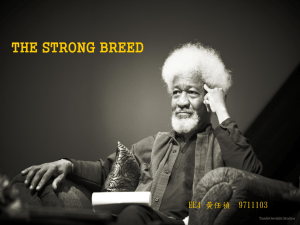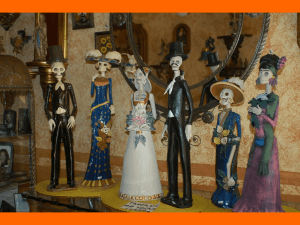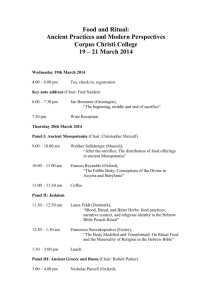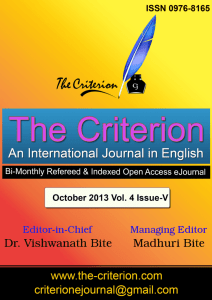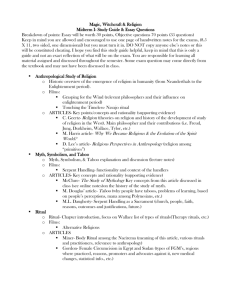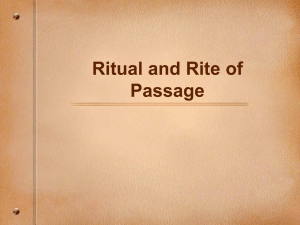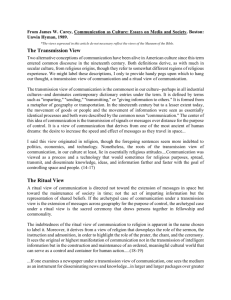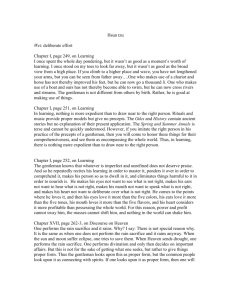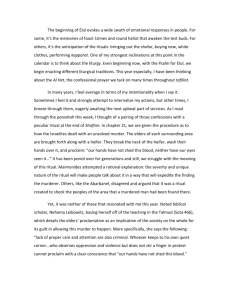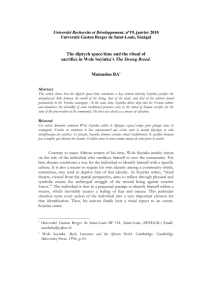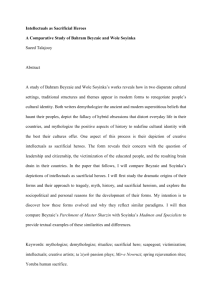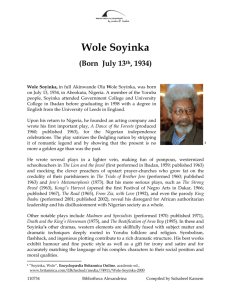Abstract - Online International Interdisciplinary Research Journal
advertisement
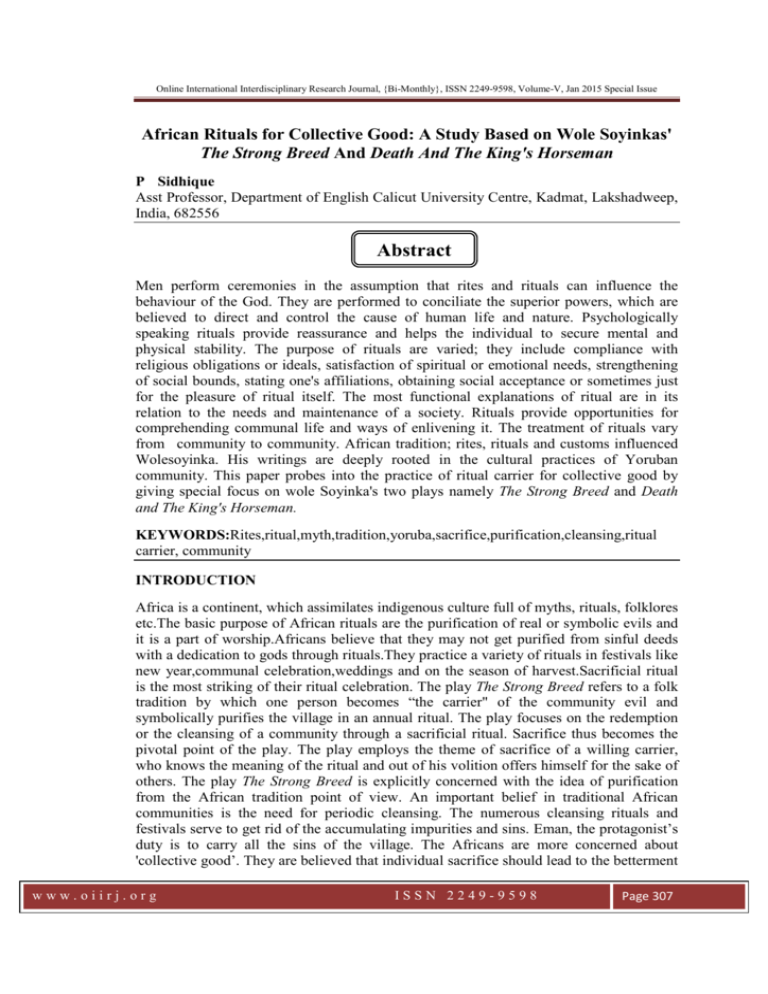
Online International Interdisciplinary Research Journal, {Bi-Monthly}, ISSN 2249-9598, Volume-V, Jan 2015 Special Issue
African Rituals for Collective Good: A Study Based on Wole Soyinkas'
The Strong Breed And Death And The King's Horseman
P Sidhique
Asst Professor, Department of English Calicut University Centre, Kadmat, Lakshadweep,
India, 682556
Abstract
Men perform ceremonies in the assumption that rites and rituals can influence the
behaviour of the God. They are performed to conciliate the superior powers, which are
believed to direct and control the cause of human life and nature. Psychologically
speaking rituals provide reassurance and helps the individual to secure mental and
physical stability. The purpose of rituals are varied; they include compliance with
religious obligations or ideals, satisfaction of spiritual or emotional needs, strengthening
of social bounds, stating one's affiliations, obtaining social acceptance or sometimes just
for the pleasure of ritual itself. The most functional explanations of ritual are in its
relation to the needs and maintenance of a society. Rituals provide opportunities for
comprehending communal life and ways of enlivening it. The treatment of rituals vary
from community to community. African tradition; rites, rituals and customs influenced
Wolesoyinka. His writings are deeply rooted in the cultural practices of Yoruban
community. This paper probes into the practice of ritual carrier for collective good by
giving special focus on wole Soyinka's two plays namely The Strong Breed and Death
and The King's Horseman.
KEYWORDS:Rites,ritual,myth,tradition,yoruba,sacrifice,purification,cleansing,ritual
carrier, community
INTRODUCTION
Africa is a continent, which assimilates indigenous culture full of myths, rituals, folklores
etc.The basic purpose of African rituals are the purification of real or symbolic evils and
it is a part of worship.Africans believe that they may not get purified from sinful deeds
with a dedication to gods through rituals.They practice a variety of rituals in festivals like
new year,communal celebration,weddings and on the season of harvest.Sacrificial ritual
is the most striking of their ritual celebration. The play The Strong Breed refers to a folk
tradition by which one person becomes “the carrier" of the community evil and
symbolically purifies the village in an annual ritual. The play focuses on the redemption
or the cleansing of a community through a sacrificial ritual. Sacrifice thus becomes the
pivotal point of the play. The play employs the theme of sacrifice of a willing carrier,
who knows the meaning of the ritual and out of his volition offers himself for the sake of
others. The play The Strong Breed is explicitly concerned with the idea of purification
from the African tradition point of view. An important belief in traditional African
communities is the need for periodic cleansing. The numerous cleansing rituals and
festivals serve to get rid of the accumulating impurities and sins. Eman, the protagonist’s
duty is to carry all the sins of the village. The Africans are more concerned about
'collective good’. They are believed that individual sacrifice should lead to the betterment
www.oiirj.org
ISSN 2249-9598
Page 307
Online International Interdisciplinary Research Journal, {Bi-Monthly}, ISSN 2249-9598, Volume-V, Jan 2015 Special Issue
of the community. Eman sacrificed his life for the collective good of his people. Death
and The King's Horseman depicts a cultural conflict between the white and the traditional
Black Africans. A colonial district officer tries to prevent the ritual suicide demanded by
the death of the King. Elesin plays the role of King's horseman in this play. The King's
horseman must die within the thirty days of the King's death. This ritual suicide is
enacted by a powerful act of the individual's will power and without external stimulus.
EMAN AND ELESIN AS RITUAL CARRIERS IN YORUBAN COMMUNITY.
Soyinka explains what he means by collective good in an interview with Louis Gates, “I
insist on reading 'collective good' as an expression which refers to the total, to the masses
of society not as expressed, as defined by the propaganda machinery of a privileged
minority...(40). The setting of the play The Strong Breed is a village, where year's
accumulated sins are to be removed by a carrier. Eman, the protagonist of the play came
to the village as a teacher. On the night of the purification ceremony of that village, he
learns that Ifada, an helpless idiot boy whom he has befriended has been selected as' the
carrier' and victim. Eman tried to save the life of Ifada by appearing himself as the
'carrier' of the village. In fact he ran away from the role of the carrier that he got as
hereditary. Now Eman accepts his past and discovers, "I am very much my father's son"
(TSB 126). He becomes one of 'the strong breeds' who must shoulder the responsibility to
cleanse the society.
By depicting Eman as a 'ritual carrier' Soyinka makes use of the ritual common among
'river people' in Nigeria and West Coast of Africa. Among them a person takes upon
himself all the burden of the society in the symbolic form of a canoe-shaped object. This
is taken to the river or sea to be floated or buried on the shore. These individual carriers
are struck by a mysterious disease and they die later. Eman's concern was that the carrier
should be 'willing'. He felt it was shame to use someone who was unwilling. Since Ifada
was such a person he offers himself as a "willing carrier". Eman's sacrifice has both
Christian and traditional references. Eman, like Christ is both teacher and healer working
among the people who do not want or understand him. But he willingly sacrifices himself
for them and in the end is hanged on a sacred tree (cross).His need for water towards the
climax parallels Christ's cry , "...I thirst".Eman is not modeled on Christ alone, he is a
very African figure and has other African prototypes. He is not only the moral force for
the annual ritual cleansing of the village of its evils but also the artists who is burdened
within the cause of social purgation. Soyinka suggests that such voluntary sacrifices as
Eman's are necessary for the ultimate redemption of the society.
Wole Soyinka's Death and The King's Horseman is based on the events in Yoruba land
where a King's horseman has to perform a ritualistic suicide which had been demanded of
the chief's horseman by tradition. Elesin is the representative of the 'ritual carrier' in the
African society and played the role of a sacrificial messenger to the gods. His duty was to
escort the King to the world after the King's death. If the Horseman fails to perform his
duty the community turns to be at risk.
According to Soyinka there are four stages of human existence. The past is the ancestors;
the present belongs to the living and the future to the unborn. The fourth stage is the stage
of existence but somewhere between the two. In the play, he demonstrated the theory of
www.oiirj.org
ISSN 2249-9598
Page 308
Online International Interdisciplinary Research Journal, {Bi-Monthly}, ISSN 2249-9598, Volume-V, Jan 2015 Special Issue
the fourth stage in the vicious circle of life. The pusillanimity of man to visit the world of
the dead and the circle is caused by the inherent fear of crossing the ''fourth stage''. Elesin
is afraid to cross the fourth stage even after he had all he demanded for. The horseman's
ritual is the transition of Elesin from the world of the living to that of the ancestors.
In Yoruban world-view death is not a cessation of existence but a mere transition into a
continued existence, and that the unborn, the living and the dead from a continuum
underpin the play's metaphysical scheme. Hence, the King in the play is not thought as
dead but as having passed on to another mode of being where he is waiting at the gate to
make his proper entrance. It is Elesin's duty, as the King's Horseman to cross this realm
of transition and reach his master and escorts him with honors to the next world. The
native believes that it is the horseman's duty to save the life of his natives by committing
a ritual suicide. The seriousness of the responsibility that is vested on him is stressed
repeatedly by the praise singer and the chorus of the women.
Elesin himself knew his status as a horseman, he says: "You all know what I am... I am
the master of my fate...the world i know is good...I was born to keep it so "(DKH 17).
Soyinka presents Elesin as virile, dominant, socially prestigious men who are willing to
offer him for the sacrifice. This ritual sacrifice is to be viewed as a willing sacrifice of an
individual self on behalf of religious principle. Elesin also fails to do his duty due to his
excessive love of material world when the time comes. His tragic flaw is his materialistic
self-interest. But Olunde, the eldest son of Elesin steps into perform a role which his
father failed. Elesin confesses shamefully: "My powers deserted me. My charms, my
spells, even my voice lacked strength when I made to summon the powers that would
lead me over the last measure of Earth into the land of the fleshless"(DKH 68). Instead of
Elesin Olunde sacrifices his own life for the welfare of the people. But the ritual sacrifice
is not of a King's Horseman. Soyinka uses the sacrifice as a symbol of spiritual
transcendence. It is a symbol for the determination to be true to one's roots. Olunde's
sacrifice symbolizes a value higher than of self-interest and the external threat of an
imposed alien culture.
Wole Soyinka's plays The Strong Breed and Death and The King's Horseman are
symbolic plays carrying the subject of the 'ritual carrier' of the African society. The role
of the scapegoat and his ritual job as a heroic carrier of the community's excess of evils
hanging in the air, and peoples' outcry for health of the community. Eman in The Strong
Breed and Elesin in Death and The King's Horseman are the representatives of the 'ritual
carriers' in the African society. Both Eman and Elesin are aware of their destiny that they
are inescapable and if they fail to perform their duty as a sacrificial messenger to the
gods, their community is put at risk. The community doesnot allow them to do so. As
exemplified by Jesus Christ who, according to Christians,'come to the world and
reluctantly died for his people's sins.' Eman and Elesin reluctantly sacrificed self to save
their individual communities in the manner likes of Christ himself.
Eman and Elesin strongly believe in the necessity of the completion of the sacrificial
rituals, view them as a way to strengthen, renew and sustain their communities. Through
these characters Soyinka affirms the dying tradition of the ritualistic self-sacrifice,
because it forms the crux of his vision, which is based on African sense of well-being. By
studying the characters Eman and Elesin, we get a true picture of the social history of the
www.oiirj.org
ISSN 2249-9598
Page 309
Online International Interdisciplinary Research Journal, {Bi-Monthly}, ISSN 2249-9598, Volume-V, Jan 2015 Special Issue
country which reveals a broadminded spectrum of attitude of that community towards
human sacrifice. Some Yorba communities clamped down on the practice of this ritual
sacrifice. Eman and Elesin are not supermen. They are the ordinary man like us. But they
are the people selected by God to perform the sacrificial messenger to him. Both of them
sacrifice their life for the positive solutions to the society. They are offering themselves
for the sake of others.
Eman in The Strong Breed and Elesin in Death and the King's Horseman are the 'ritual
carriers' selected by their community. But Eman;s role as a ritual carrier is quite different
from that of Elesin's. Because in "The Strong Breed" Eman's duty is to purify the village
in an annual ritual and the duty upon him is the cleansing of a community through a
sacrificial ritual. But that sacrificial ritual is entirely different from that in "Death and the
King's Horsemen. In The Strong Breed, the village people selects strangers as the 'ritual
carrier' and when that stranger performs his duty as a 'carrier', once he received all the old
year’s evils, he should leave the village and never return to there. If he returns the village
will be at risk. So the people of that village would never let him back. But in the case of
Elesin in Death and the King's Horseman, he is the King's horseman and his duty is to
accompany the King in another world where the King would reach after his death. So he
will have to sacrifice his life within thirty days after the King's death. Without the
horseman the king would be unhappy and his curses would fall upon the people.
In both the plays we can see a temporary weakness of will bringing shame on the
main characters. In The Strong Breed Eman knew the fact that he would not be able to
return to that village if he becomes the carrier. So he ran away from the role that the
society assigned him. Likewise Elesin decided to escape from the role. In that particular
juncture they wondered if they were destined to destroy the society. And finally they
understand that death or sacrificing themselves was an act of will that affirms their
identity and destiny. Soyinka believes that tragedy results from the will of the hero to
challenge the world.
CONCLUSION
In a Youruba community there is no place for individual rights, they believed in
the collective Good. For that an individual should sacrifice his life for the betterment of
the society. So the protagonists in both plays embraced death for the welfare of the
community by gathering the will power. Soyinka asserts the need of will power to
regenerate the society as it is the most fundamental theme of his major works. The need
for individual to submit himself to a process of self- recreation and for communities to
undergo periodic cleansing and emerge from inertia is a message repeatedly established
by his writings. African religion and the metaphysical system recognize the need for
periodic renewal of the spirit both at individual and communal level. Yoruba rituals have
this message at their core. Soyinka's favorite settings are festivals, the gathering of the
tribes, the new Yam festival, Ogun festival or Eleusinian festival all of which are charged
with regenerate potential. According to Soyinka a regenerated society will be free from
tyranny, brutalization, alienation and economic exploitation.
In order to get rid of the accumulating impurities and sins of the African's, the
playwright developed a role model for African's, whose duty is to purify the society by
www.oiirj.org
ISSN 2249-9598
Page 310
Online International Interdisciplinary Research Journal, {Bi-Monthly}, ISSN 2249-9598, Volume-V, Jan 2015 Special Issue
sacrificing his own life for the sake of his society. Soyinka opines that an individual has
to take all the dust-bin of evil for the sake of the community and to be a part of
regenerating a society and a nation. It calls for the necessity of rituals as it plays an
important role in the regeneration of the society. Man has the power to monitor the course
of mankind but leaders and strong men misuse these. Their decisions are motivated by
petty interests and selfish motives. The power of will is something that itself can lead a
society for its own welfare. The 'will' can lead man to prosperity and sometimes to
disastrous ends. In both The Strong Breed and Death and the King's Horseman presented
the conflict between the will and demands of the society .the will power help the Africans
to get rid of the colonized self.
Wole Soyinka perceives regeneration or renewal as a historically realizable goal
for communities and nations. In an interview with Louis Nkosi, Soyinka spoke about the
role of African writers. He says, " The tremendous pace of change and ideas of
regeneration and salvation are things that African writers can profitably put in their work"
(David 174).wole soyika presented African people, their language, rituals, style, tradition,
customs, myths and beliefs not only to say about African culture but also to regenerate
the African society. Since exceptional individuals like Eman and Elesin are capable of
this expanded consciousness the transformation of the society proceeds from their
actions. Soyinka seems to be exploring vast pattern of possibilities understanding that
there are no facile answers and he is caught up in the infinite possibilities of the mind.
BIBLIOGRAPHY
1. Beier, Ulli. ed. An Introduction to African Literature. An Anthology of critical
writing. London : Longman Ltd, 1967
2. Cook, David. African Literature: A critical view.London : Longman, 1978
3. Esslin,Martin. "Two Nigerian Play wrights: Wole Soyinka; J.P. Clark."An
Introduction to African Literature. An Anthology of Critical Writing. London :
Longman Ltd, 1967
4. Gates,Louis. "An Interview: Wole Soyinka" Dennis Duerden & Cosmo
Pieterse.ed. African Writers Talking. London : Cox & Wyman Ltd, 1972
5. Gates, Henry Louis. Jr., ed. Black Literature and Literary Theory. London :
Eyremethuen, 1984
6. Grimes, Ronald L. The Beginning of Ritual Studies. Columbia : Soputh Carolina
Press, 1994
7. Soyinka, Wole. Art, Dialouge and Outrage Essays on Literature and Culture.
London : New Horn Press Ltd., 1988
8.
9.
www.oiirj.org
---.
---.
The Strong Breed. London : Oxford University Press, 1973
Death and the King's Horseman. London : Eyremethuen,1975
ISSN 2249-9598
Page 311
